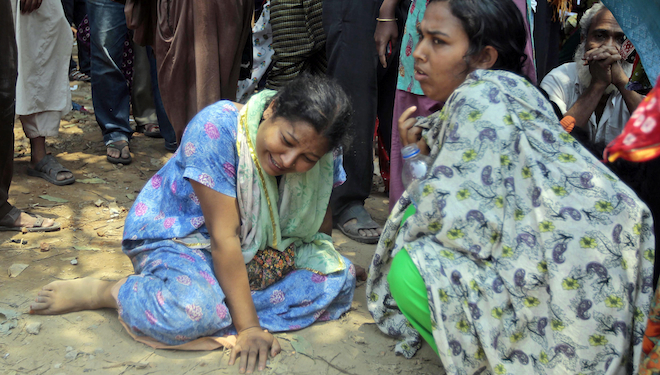Joe Fresh clothing made at site of deadly Bangladesh factory collapse
Workers spoke of large cracks in the building, reports say
A Bangladeshi woman cries as they waits for news of relatives trapped in a building that collapsed in Savar, near Dhaka, Bangladesh, Wednesday, April 24, 2013. An eight-story building housing several garment factories collapsed near Bangladeshâs capital on Wednesday, killing dozens of people and trapping many more under a jumbled mess of concrete. Rescuers tried to cut through the debris with earthmovers, drilling machines and their bare hands. (AP Photo/A.M.Ahad)
Share

Nearly a hundred people have reportedly died and as many as a thousand have been injured in the collapse of an eight-story factory in Bangladesh, which supplied clothing to Canadian retailer Joe Fresh, owned by Loblaw.
Reports from Reuters say 96 people are confirmed dead, while the Associated Press reports 87 workers have died, in the second major deadly incident at a Bangladesh factory in the outskirts of the capital, Dhaka. In November, 112 people died in a fire in the fashion district of Tazreen at a building that supplied garments to Gap and Wal-Mart.
The Rana Plaza building, a complex of garment factories about 30 km outside Dhaka, supplied clothing to the low-cost U.K. retailer Primark and brands including Bennetton in addition to Joe Fresh, CBC news reports.
In a statement to media, Loblaw Companies Inc.’s vice-president of public relations Julija Hunter said “the large complex, housing a commercial bank and shopping mall, also included a factory that produced a small number of Joe Fresh apparel items.”
“We will be working with our vendor to understand how we may be able to assist them during this time,” the statement continues.
Workers told reporters of large cracks in the building that made them hesitant to go inside Wednesday morning, but factory managers assured them the building was safe.
“After about an hour or so, the building collapsed suddenly,” Abdur Rahim, a worker on the fifth floor, told the Associated Press.
Primark said it was “shocked and deeply saddened by the appalling incident,” in a statement to AP. The company has been reviewing factory standards, the statement continues, and will now also focus on building safety.
Wal-Mart could not confirm whether any of its products were made at factories in the collapsed building, Reuters reports, a fact which points to the complex network of sub-contracting that has fueled Bangladesh’s $20-billion-a-year textile industry.
Bangladesh’s Home Minister Muhiuddin Khan Alamgir told media Wednesday that “the culprits would be punished.” It’s not clear whether his comment refers to the factory operators, or the mega-chains that hire them to produce cheap goods—an option that would only be possible once companies like Wal-Mart determined whether they indeed were the end destination for the goods.
The CBC program As it Happens posted this tweet, with an image of a Joe Fresh item buried in the rubble of the factories:
